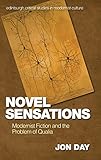Novel Sensations : Modernist Fiction and the Problem of Qualia / Jon Day.
Material type: TextSeries: Edinburgh Critical Studies in Modernist Culture : ECCSMCPublisher: Edinburgh : Edinburgh University Press, [2022]Copyright date: ©2020Description: 1 online resource (208 p.)Content type:
TextSeries: Edinburgh Critical Studies in Modernist Culture : ECCSMCPublisher: Edinburgh : Edinburgh University Press, [2022]Copyright date: ©2020Description: 1 online resource (208 p.)Content type: - 9781474458399
- 9781474458412
- 823/.91209384 23
- online - DeGruyter
| Item type | Current library | Call number | URL | Status | Notes | Barcode | |
|---|---|---|---|---|---|---|---|
 eBook
eBook
|
Biblioteca "Angelicum" Pont. Univ. S.Tommaso d'Aquino Nuvola online | online - DeGruyter (Browse shelf(Opens below)) | Online access | Not for loan (Accesso limitato) | Accesso per gli utenti autorizzati / Access for authorized users | (dgr)9781474458412 |
Frontmatter -- CONTENTS -- ACKNOWLEDGEMENTS -- SERIES EDITORS’ PREFACE -- INTRODUCTION: MODERNIST FICTION AND THE PROBLEM OF QUALIA -- 1 COGNITIVE REALISM, QUALIA AND THE INWARD TURN -- 2 WHAT VIRGINIA DIDN’T KNOW: KNOWLEDGE, IMPRESSIONISM AND THE EYE -- 3 WHAT IS IT LIKE TO BE LEOPOLD BLOOM? -- 4 NEUROMODERNISM AND THE EXPLANATORY GAP -- 5 SAMUEL BECKETT AND MODERNISM’S NARRATIVES OF REDUCTION -- 6 HOLLOW MEN AND CHINESE ROOMS: WYNDHAM LEWIS AND THE WILL-TO-AUTOMATISM -- CONCLUSION: MODERNISM, QUALIA AND THE NARRATIVES OF BEHAVIOURISM -- BIBLIOGRAPHY -- INDEX
restricted access online access with authorization star
http://purl.org/coar/access_right/c_16ec
A radical intervention into critical debates over the status of sensation within modernist literatureOffers novel and insightful readings of key modernist authors within their philosophical contextsCritiques a range of ‘neuroaesthetic’ approaches to literary criticismProposes new ways of thinking about the relationship between philosophy, literature and technology within modernist studies.Concentrating on the work of four major modernist authors – Virginia Woolf, James Joyce, Wyndham Lewis and Samuel Beckett – this book examines the close links between modernist literature and the philosophy of mind. By historicising the qualia debate and situating it within its cultural and literary contexts, it stages interventions into a range of academic debates: over the status of ‘sensations’ and ‘sense data’ within modernist fiction, over the scope and possibility of ‘neuroaesthetic’ approaches to literary criticism, and over the relationship between literature, philosophy and technology in the modernist moment.
Mode of access: Internet via World Wide Web.
In English.
Description based on online resource; title from PDF title page (publisher's Web site, viewed 29. Jun 2022)


